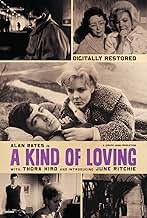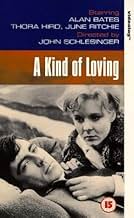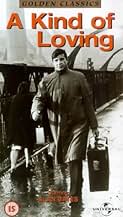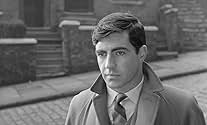ÉVALUATION IMDb
7,3/10
2,8 k
MA NOTE
Ajouter une intrigue dans votre langueAfter his girlfriend's pregnancy forces him to marry her, a young man must adjust to his new life and contend with his domineering mother-in-law.After his girlfriend's pregnancy forces him to marry her, a young man must adjust to his new life and contend with his domineering mother-in-law.After his girlfriend's pregnancy forces him to marry her, a young man must adjust to his new life and contend with his domineering mother-in-law.
- Nominé pour le prix 4 BAFTA Awards
- 1 victoire et 4 nominations au total
Histoire
Le saviez-vous
- AnecdotesAt the start of this movie, Victor Arthur "Vic" Brown (Sir Alan Bates) and some of his friends are seen perusing a magazine filled with shots of topless models. This is one of the first instances in British cinema showing bared breasts.
- GaffesIn the opening wedding scene, an elderly relative is prevented from taking photographs when the wedding car pulls up in front of her. She is, however, then seen taking pictures on the other side of the car as the bride and groom get in. Then as the car pulls away, she is back in her original position on the 'wrong' side of the car, still unable to take photos.
- Citations
Mrs. Rothwell: How dare you! How dare you say such filthy, disgusting things! You come into this house drunk, filthy drunk! You're filthy! You talk filth, you ARE filth! You're filth! You filthy pig! You filthy, disgusting pig! Filth, FILTH!
- ConnexionsFeatured in Eurythmics & Aretha Franklin: Sisters Are Doin' It for Themselves (1985)
- Bandes originalesDown by the Riverside
(uncredited)
Written by Billy Sherrill and Charlie Rich
Sung at a bar on the pub crawl.
Commentaire en vedette
I own very few movies - this is one of them. I've seen it many times and am always moved.
It is of course part of the special "Angry Young Man" genre that includes Billy Liar, The Loneliness of the Long Distance Runner, The Entertainer, Darling, A Taste of Honey, This Sporting Life, Look Back in Anger, Room at the Top, Saturday Night and Sunday Morning - and in later years, In Celebration and The Homecoming.
Such novelists/playwrights as John Braine, Alan Sillitoe, David Storey, John Osborne, Arnold Wesker, John Wain, Shelagh Delaney, directors like Karel Reisz, John Schlesinger, Lindsay Anderson and Tony Richardson, and such screenwriters as Waterhouse and Hall (who wrote this as Billy Liar).
The movies are primarily about men trapped by place and morality -- and either lashing out/escaping or trying to accommodate themselves to their situation. Most are set in the north of England - all are about people from working class backgrounds.
Stars like Richard Harris, Julie Christie, Alan Bates, Ian Holm, Albert Finney, and Tom Courtenay broke in their film teeth with these movies - and others such as Richard Burton, Lawrence Olivier, Laurence Harvey and Dirk Bogarde revealed their expansive range.
The protagonists are often not likable - certainly the pitiful Archie Rice in The Entertainer, Burton's character in Look Back in Anger, Finney's in Saturday Night and Sunday Morning, Courtenay's character in "Long Distance Runner" or Richard Harris' character -- are all people you'd rather not accompany on a long train journey.
However, Vic Brown, the protagonist in this one - is largely sympathetic (and wonderfully written and portrayed). His plight is just so realistic - and the consequences so easy to believe.
There are many things that our lad gets wrong - unable to break things off with a woman, he simply ignores her (and speaks badly of her to others) - yet is helpless when she suggests they get together again. In part, this is because his lust masters him - and in part because he just can't bear to tell someone he no longer wants to see her.
As awful as most audiences will find Ingrid's mother (wonderfully played), one can also have sympathy for her - a widow overly protective of her only child, and the circumstances in which her child finds herself.
The modesty of the characters is wonderful yet not overly done - it is the characteristic that yields immense sympathy in the viewer - this is especially true of the Brown family - from "our Christine" and her gentle husband to Vic's wonderful father and brother to his forceful mother.
Most of the reviews speak of this very much as a look back in time - I think it's not so past.
The themes are universal and timeless: lust and its consequences, indecision about a romantic partner, the division between a young person's caution about taking the right steps in life and closeness to family vs. inchoate yearnings to do great things far away - these are the stuff of such plays as The Fantasticks and such movies as It's a Wonderful Life. (Donna Reed's character wanted Jimmy Stewart's no less than Ingrid wanted Vic - and both men had dreamt to be far away doing great things).
This is wonderful - it will strike anyone as sharply observed, wonderfully written - and very moving.
It is of course part of the special "Angry Young Man" genre that includes Billy Liar, The Loneliness of the Long Distance Runner, The Entertainer, Darling, A Taste of Honey, This Sporting Life, Look Back in Anger, Room at the Top, Saturday Night and Sunday Morning - and in later years, In Celebration and The Homecoming.
Such novelists/playwrights as John Braine, Alan Sillitoe, David Storey, John Osborne, Arnold Wesker, John Wain, Shelagh Delaney, directors like Karel Reisz, John Schlesinger, Lindsay Anderson and Tony Richardson, and such screenwriters as Waterhouse and Hall (who wrote this as Billy Liar).
The movies are primarily about men trapped by place and morality -- and either lashing out/escaping or trying to accommodate themselves to their situation. Most are set in the north of England - all are about people from working class backgrounds.
Stars like Richard Harris, Julie Christie, Alan Bates, Ian Holm, Albert Finney, and Tom Courtenay broke in their film teeth with these movies - and others such as Richard Burton, Lawrence Olivier, Laurence Harvey and Dirk Bogarde revealed their expansive range.
The protagonists are often not likable - certainly the pitiful Archie Rice in The Entertainer, Burton's character in Look Back in Anger, Finney's in Saturday Night and Sunday Morning, Courtenay's character in "Long Distance Runner" or Richard Harris' character -- are all people you'd rather not accompany on a long train journey.
However, Vic Brown, the protagonist in this one - is largely sympathetic (and wonderfully written and portrayed). His plight is just so realistic - and the consequences so easy to believe.
There are many things that our lad gets wrong - unable to break things off with a woman, he simply ignores her (and speaks badly of her to others) - yet is helpless when she suggests they get together again. In part, this is because his lust masters him - and in part because he just can't bear to tell someone he no longer wants to see her.
As awful as most audiences will find Ingrid's mother (wonderfully played), one can also have sympathy for her - a widow overly protective of her only child, and the circumstances in which her child finds herself.
The modesty of the characters is wonderful yet not overly done - it is the characteristic that yields immense sympathy in the viewer - this is especially true of the Brown family - from "our Christine" and her gentle husband to Vic's wonderful father and brother to his forceful mother.
Most of the reviews speak of this very much as a look back in time - I think it's not so past.
The themes are universal and timeless: lust and its consequences, indecision about a romantic partner, the division between a young person's caution about taking the right steps in life and closeness to family vs. inchoate yearnings to do great things far away - these are the stuff of such plays as The Fantasticks and such movies as It's a Wonderful Life. (Donna Reed's character wanted Jimmy Stewart's no less than Ingrid wanted Vic - and both men had dreamt to be far away doing great things).
This is wonderful - it will strike anyone as sharply observed, wonderfully written - and very moving.
- trpdean
- 3 juill. 2004
- Lien permanent
Meilleurs choix
Connectez-vous pour évaluer et surveiller les recommandations personnalisées
- How long is A Kind of Loving?Propulsé par Alexa
Détails
- Date de sortie
- Pays d’origine
- Langues
- Aussi connu sous le nom de
- A Kind of Loving
- Lieux de tournage
- The Promenade, St Anne's on Sea, Fylde, Lancashire, Angleterre, Royaume-Uni(honeymoon of Vic and Ingrid)
- sociétés de production
- Consultez plus de crédits d'entreprise sur IMDbPro
Box-office
- Budget
- 165 000 £ (estimation)
- Brut – États-Unis et Canada
- 6 912 $ US
- Fin de semaine d'ouverture – États-Unis et Canada
- 3 278 $ US
- 9 avr. 2017
- Brut – à l'échelle mondiale
- 6 912 $ US
- Durée1 heure 53 minutes
- Couleur
- Rapport de forme
- 1.66 : 1
Contribuer à cette page
Suggérer une modification ou ajouter du contenu manquant

Lacune principale
What is the French language plot outline for Un amour pas comme les autres (1962)?
Répondre






























